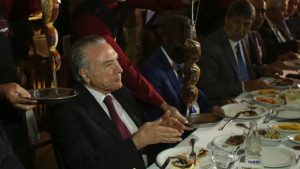 Brazilian president Michel Temer, who is confronting a huge corruption scandal that is tarnishing the country’s lucrative meat industry, on Sunday met with executives as well as foreign diplomats in an attempt to assuage the health concerns that are tarnishing a sector that represents $12 billion of Brazil’s exports annually.
Brazilian president Michel Temer, who is confronting a huge corruption scandal that is tarnishing the country’s lucrative meat industry, on Sunday met with executives as well as foreign diplomats in an attempt to assuage the health concerns that are tarnishing a sector that represents $12 billion of Brazil’s exports annually.
The meetings followed raids by Brazilian police Friday that are investigating whether companies were paying bribes to conceal conditions deemed unsanitary at meatpackers. Temer is working to protect one of the few sectors that has remained vibrant in the largest economy in Latin America hit by two years of deep recession.
The scandal has hit the prices of stock at JBS SA, the largest meat exporter in the world and BRF SA a poultry exporter, after both had been targeted in what was dubbed Operation Weak Flesh. Dozens of other smaller rivals were targeted as well.
Temer, who took a few of the diplomats to eat at a steakhouse following the meeting, called the raids isolated, but necessary to fight corruption.
The president of Brazil looked to dispel any fears of the sector having system flaws, as today the sector is the world’s largest beef exporter as well as a number of other meat products.
Temer said the country’s investigators would speed up their probe and stressed that the raids on Friday affected only 21 of over 4,800 meatpackers nationwide. Just 33 of over 11,000 inspectors were under investigation.
Despite police allegations that some meat producers sold adulterated and rotten meat products, a senior official in the Agriculture Ministry said no sanitary risk was found.
The allegations were worrisome from a point of view of crime and corruption, but from a perspective of health, the ministry is confident the sanitary issues that were alleged are not representative of a risk for exports or consumers.
As such, officials in the government following the meeting quickly pointed out that the success in Brazil from the standpoint of a meat producer comes from what is a high-regarded and efficient system of controls for sanitation.
They also noted that none of the over 150 countries that currently buy Brazilian exported meat had suspended its imports.
